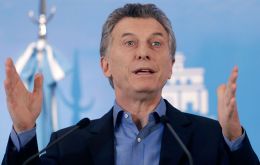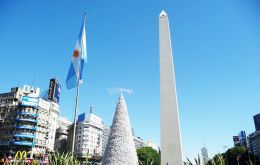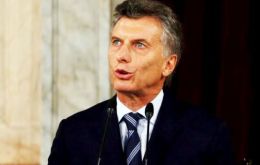MercoPress. South Atlantic News Agency
Tag: Indec index
-
Wednesday, May 24th 2017 - 09:06 UTC
Argentina economy grows 0.8% in March from a year earlier

Argentina's economy grew 0.8% in March from a year earlier, the Indec statistics agency said on Tuesday. The economy also grew 1.9% in March versus February, Indec said.On Tuesday the Argentines central bank also kept its benchmark interest rate at 26.25% and said it believes the country's inflation rate is easing in May.
-
Thursday, May 11th 2017 - 12:07 UTC
Argentina's 12-month inflation through April was 27.5%

Argentina's statistics agency Indec, said on Wednesday 12-month inflation through April was 27.5%, the first time it has published 12-month inflation since President Mauricio Macri took office in December 2015 and revamped data calculations. Indec said April inflation was 2.6%, above median analyst expectations for a consumer price increase of 2.1 percent.
-
Wednesday, March 29th 2017 - 10:25 UTC
Argentina's economic activity up 1.1% year to year in January

Argentina's economic activity grew in January year to year. Economic activity was 1.1% percent higher in January than twelve months before, the first year-on-year growth since last March, according to the latest release from the revamped stats office, Indec.
-
Wednesday, March 29th 2017 - 10:15 UTC
It's official: 12.7 million Argentines live in poverty, 30.3% of the population

Argentina's official poverty index in the second half of 2016 dropped to 30.3%, an estimated 12.7 million people, from 32.2% in the first half according to the country's stats office Indec. The 30.3% index includes 6.1% of indigence, which is also below the 6.3% of the first half. The drop means that 800.000 people are no longer in the poverty category index.
-
Friday, March 17th 2017 - 21:55 UTC
Unemployment in Argentina falls to 7.6%: less people looking for jobs

Argentina's unemployment rate fell to 7.6% in the fourth quarter of 2016, the government's Indec statistics agency said in a report on Thursday, down from 8.5% in the third quarter as thousands of people stopped looking for work.
-
Monday, March 13th 2017 - 12:11 UTC
A third of Argentina's population live in poverty, according to the Catholic Church

Argentina urban poverty rate rose to 32.9% in the third quarter of 2016, which means 13 million people due to a precarious labor market and lack of long-term development policies, according to a report presented last week by the Social Debt Observatory from the Argentine Catholic University (UCA).
-
Saturday, January 7th 2017 - 07:35 UTC
Half the Argentine labor force make a monthly average of US$ 565, says Indec

Half the Argentine labor force employed was making at the end of the third quarter a monthly average of 9.000 Pesos, equivalent approximately to US$ 565, while the poorest 10% averaged 2.500 Pesos (approx US$ 165) and the richest 10%, anywhere from 20.000 to 250.000 Pesos (US$ 1.250 to 15.000) a month, according the revamped Argentine stats and census office, Indec.
-
Thursday, September 29th 2016 - 10:35 UTC
One in three Argentines, 8.8 million live in poverty and 1.7 million are indigent

Nearly one-third of Argentina’s population lives in poverty, the government said on Wednesday in the first official poverty data published in three years, underscoring the difficulty of reaching President Mauricio Macri’s stated “zero poverty” goal. The ranks of the poor surveyed in Argentina totaled 8.8 million people, or 32.2% of the population in 31 urban areas surveyed.
-
Friday, September 23rd 2016 - 10:55 UTC
An Argentine family to remain above the poverty line needs US$ 820 a month

An Argentine average household made up of a couple with two children 6 and 8 years old needs 12.489 Pesos (approx US$ 820) to remain above the poverty line according to the stats office, Indec estimate for the month of August. The same household will have to pay 5.176 Pesos (approx US$ 340) for the Basic food basket, not to drop to indigence.
-
Tuesday, September 20th 2016 - 11:03 UTC
IMF rebuilding relations with Argentina

An IMF mission started on Monday a round of meetings with the purpose of rebuilding relations with Argentina, frozen for over a decade. The mission headed by economist Roberto Cardarelli began early Monday visiting the Argentine Industrial Union, UIA, the country's manufacturers main lobby.
